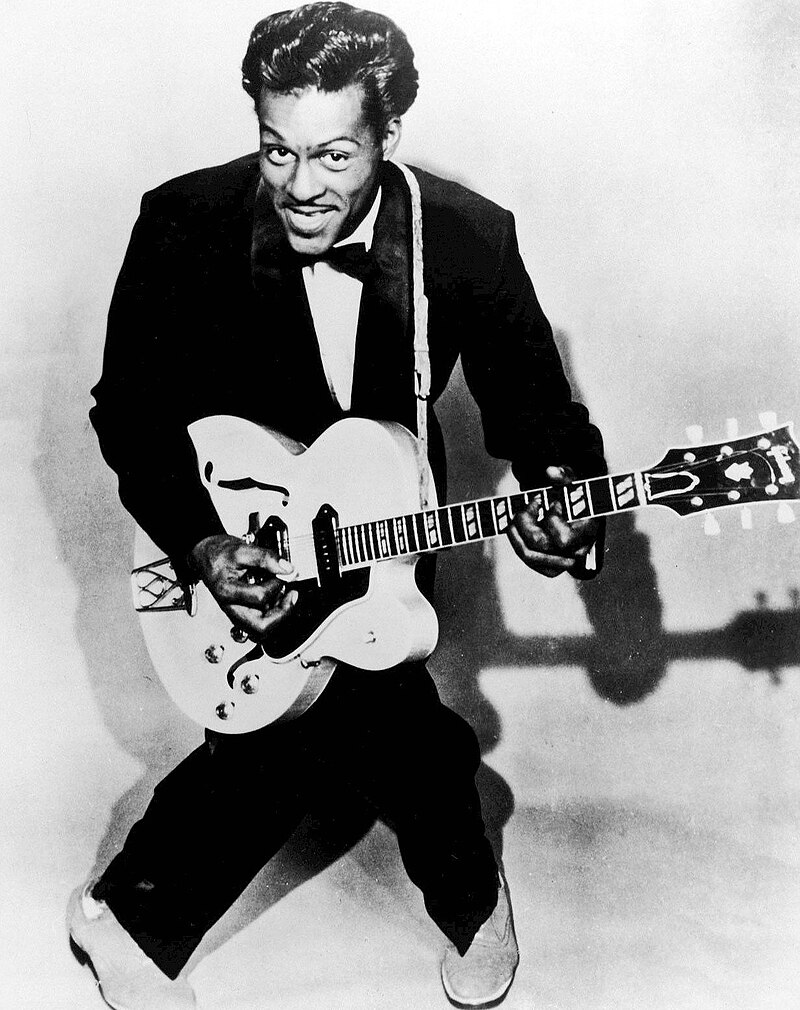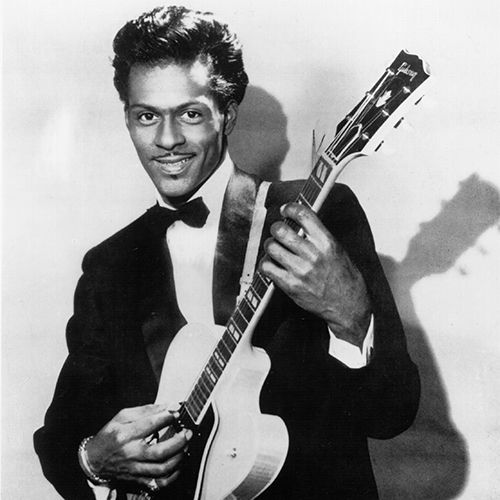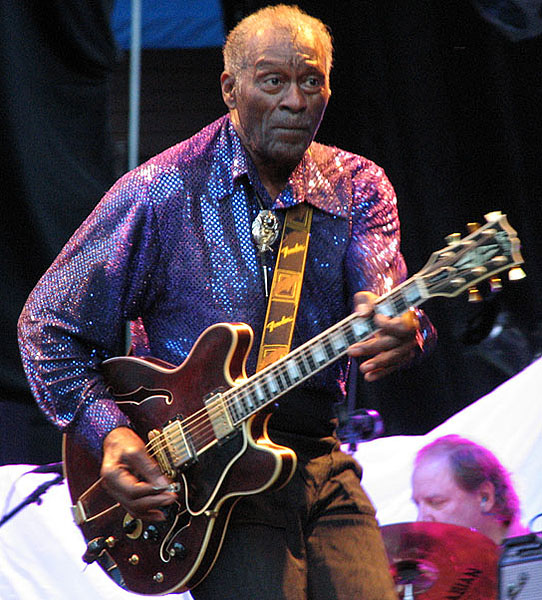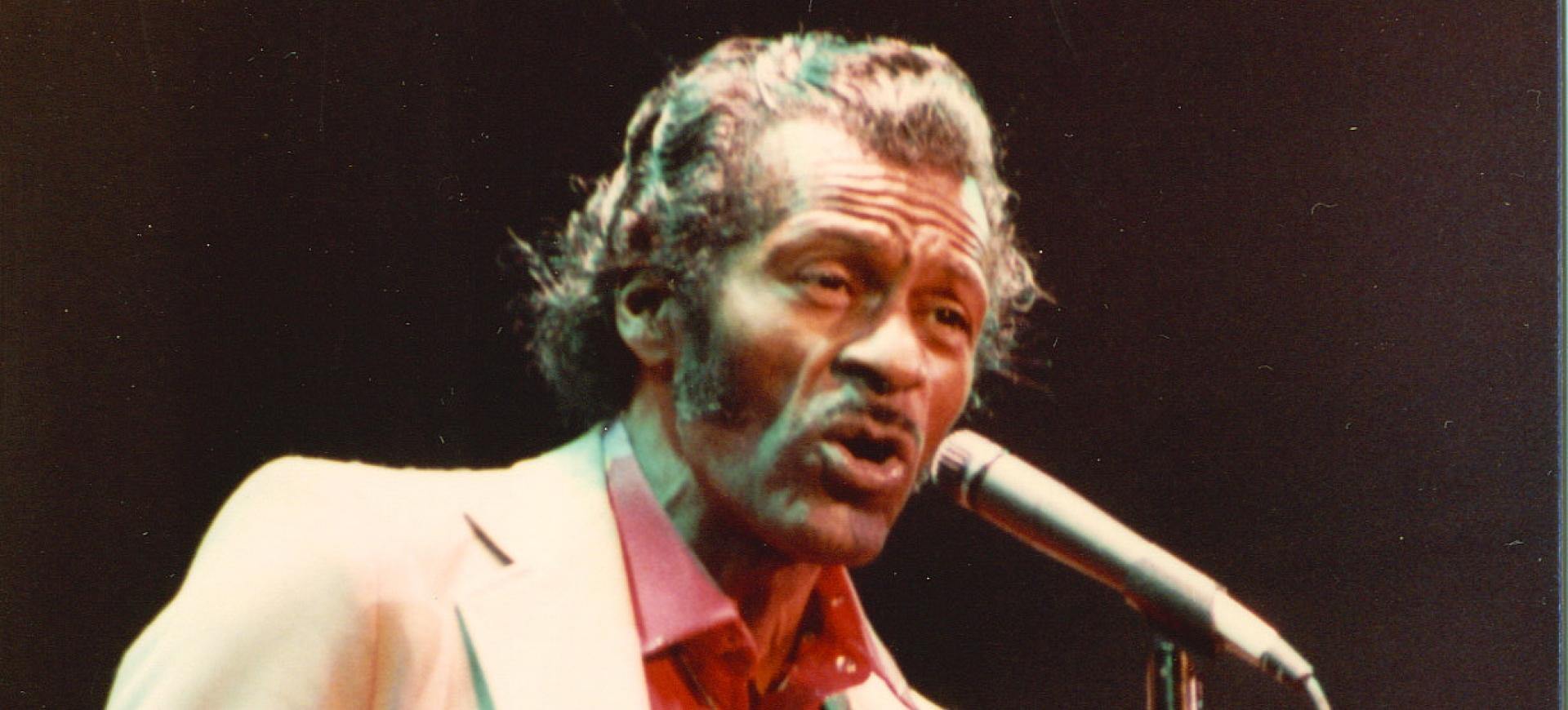Chuck Berry
Chuck Berry

Charles Edward Anderson Berry, known as Chuck Berry, was born on October 18, 1926, in St. Louis, Missouri, USA. He became an iconic American singer, guitarist, and songwriter, earning the nickname "Father of Rock and Roll" for his pioneering contributions to the genre.
Berry's influence on rock and roll cannot be overstated. He refined and transformed rhythm and blues into the distinctive elements that defined rock and roll. His classic hits, including "Maybellene" (1955), "Roll Over Beethoven" (1956), "Rock and Roll Music" (1957), and "Johnny B. Goode" (1958), epitomized the spirit and energy of the genre.
From an early age, Berry displayed a passion for music. He gave his first public performance while attending Sumner High School. However, his life took a turn when he was convicted of armed robbery during his high school years and spent three years in a reformatory.
Upon his release, Berry embraced married life and found employment at an automobile assembly plant. Influenced by blues musician T-Bone Walker, Berry began performing with the Johnnie Johnson Trio in the early 1950s.
In 1955, Berry's career skyrocketed after he recorded "Maybellene" with Chess Records, which became a chart-topping success, selling over a million copies. This marked the beginning of Berry's rise to stardom in the music industry.
Throughout the late 1950s, Berry solidified his status as a rock and roll icon with numerous hit records and electrifying performances. His innovative songwriting, focusing on themes of teen life and consumerism, along with his dynamic guitar solos and stage presence, set him apart as a major force in rock music.
Chuck Berry's impact on subsequent generations of musicians cannot be overstated. He left an indelible mark on the rock and roll landscape, inspiring countless artists with his groundbreaking contributions to the genre. His music continues to resonate with audiences worldwide, cementing his legacy as one of the greatest figures in the history of popular music.
Chuck Berry, born in St. Louis, was the youngest child, raised in the north St. Louis neighborhood known as the Ville. His father, Henry William Berry, was a contractor and deacon, while his mother, Martha Bell, was a certified public school principal. Berry's upbringing allowed him to pursue music from an early age, giving his first public performance in 1941 while still a student at Sumner High School. However, in 1944, he was arrested for armed robbery and spent time at the Intermediate Reformatory for Young Men at Algoa. He formed a singing quartet during his time there and was released on his 21st birthday in 1947.
On October 28, 1948, Berry married Themetta "Toddy" Suggs, and they had a daughter named Darlin Ingrid Berry on October 3, 1950. Berry worked various jobs in St. Louis to support his family, including factory work, janitorial work, and training as a beautician at the Poro College of Cosmetology. By the early 1950s, Berry was performing with local bands in St. Louis clubs, drawing from his blues background and taking guitar lessons from friend Ira Harris.:max_bytes(150000):strip_icc()/gettyimages-742543251-2000-6cfe5d691fe844ed93a56b8dae54e39c.jpg)
By early 1953, Berry was performing with Johnnie Johnson's trio, starting a long collaboration. He began to blend country tunes with R&B, drawing a diverse audience. In 1954, Berry recorded tracks with the group Joe Alexander & the Cubans, releasing them as a single on the Ballad label.
Berry's showmanship and musical style, influenced by blues and country, attracted a wider audience, including affluent white people, setting the stage for his successful career.
In May 1955, Chuck Berry traveled to Chicago, where he met Muddy Waters, who suggested he contact Leonard Chess of Chess Records. Berry believed his blues music would interest Chess, but Chess was more intrigued by Berry's take on "Ida Red". On May 21, 1955, Berry recorded an adaptation of the song "Ida Red", titled "Maybellene", featuring Johnnie Johnson on piano, Jerome Green on maracas, Ebby Hardy on drums, and Willie Dixon on bass. 
"Maybellene" became a huge success, selling over a million copies, reaching number one on Billboard magazine's rhythm and blues chart and number five on its Best Sellers in Stores chart for September 10, 1955. Berry noted that the song emerged at a time when African-American music was crossing over into mainstream pop.
Upon seeing a copy of the "Maybellene" record, Berry was surprised to find that two other individuals, including DJ Alan Freed, had been given writing credit, entitling them to royalties. After a court battle, Berry regained full writing credit.
By the end of June 1956, Berry's song "Roll Over Beethoven" reached number 29 on Billboard's Top 100 chart, and he toured as one of the "Top Acts of '56". He formed a friendship with Carl Perkins, who acknowledged Berry's influence and songwriting talent. In late 1957, Berry participated in Alan Freed's "Biggest Show of Stars for 1957", touring the United States with the Everly Brothers, Buddy Holly, and others. He also appeared as a guest on ABC's Guy Mitchell Show, performing his hit song "Rock 'n' Roll Music".
Berry's string of hits continued from 1957 to 1959, with over a dozen chart singles, including the US Top 10 hits "School Days", "Rock and Roll Music", "Sweet Little Sixteen", and "Johnny B. Goode". He appeared in two early rock-and-roll movies: "Rock Rock Rock" (1956), singing "You Can't Catch Me", and "Go, Johnny, Go!" (1959), in which he performed "Johnny B. Goode", "Memphis, Tennessee", and "Little Queenie". His performance of "Sweet Little Sixteen" at the Newport Jazz Festival in 1958 was captured in the motion picture "Jazz on a Summer's Day".
References
- Kalhan Rosenblatt (March 18, 2017). "Chuck Berry, father of rock 'n' roll, dies at 90". NBC News. Archived from the original on May 22, 2019. Retrieved April 27, 2019.
- a b Campbell, M. (ed.) (2008). Popular Music in America: And the Beat Goes On. 3rd ed. Cengage Learning. pp. 168–169.
- a b c d e f g "Chuck Berry". Britannica Online Encyclopedia. Archived from the original on June 4, 2020. Retrieved February 21, 2010.
- ^ Frederick, Jennifer (March 18, 2017). "Chuck Berry, a Founding Father of Rock 'n' Roll, Dies at 90". Billboard. Archived from the original on March 27, 2017. Retrieved March 27, 2017.
- ^ "Chuck Berry, a rock 'n' roll originator, dies at age 90". The Salt Lake Tribune. Associated Press. March 18, 2017. Archived from the original on March 27, 2017. Retrieved March 27, 2017.
- a b "295 F.2d 192". ftp.resource.org. Archived from the original on October 13, 2010. Retrieved June 4, 2010.
- ^ Pegg (2003, pp. 119–127).
- ^ "Chuck Berry". The Rock and Roll Hall of Fame and Museum. Archived from the original on March 19, 2017. Retrieved June 21, 2014.











































